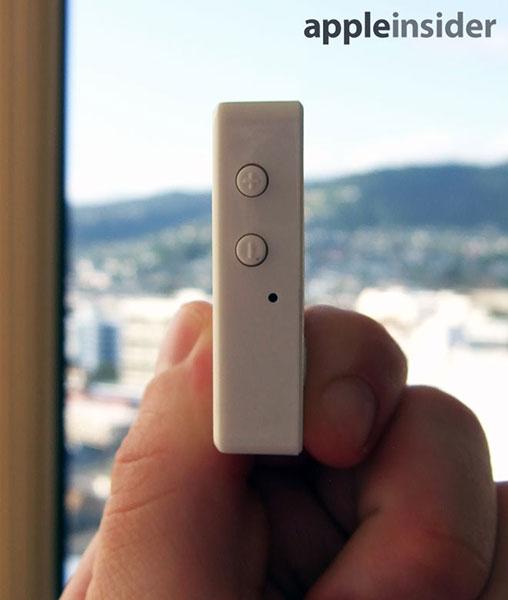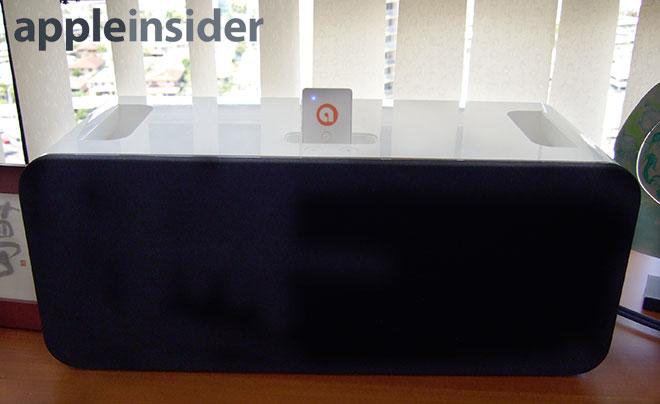First Look: 'auris' brings Bluetooth audio to legacy 30-pin docks
A Kickstarter success story, the auris is an ultra compact Bluetooth adapter that promises to bring current iOS device compatibility to docks using Apple's now defunct 30-pin standard, equipment some owners spent hundreds of dollars on over the connector's ten-year reign.
When Apple moved to the smaller Lightning I/O protocol with its latest iOS device lineup, more than a few users who upgraded to a new iPhone, iPad or iPod touch saw their legacy third party docks instantly become obsolete. Touchkraft, the people behind auris, want to change that by bridging the technology gap with Bluetooth, which is found in all Lightning-enabled products.
Looking at our demo unit provided by BiteMyApple.co, a purveyor of successfully funded Apple-centric Kickstarter projects, the hardware design is simple and somewhat reminiscent of the old 30-pin iPod shuffle, with a single multifunction button on the front and two volume actuators on the left side located directly above a pin-sized cutout for the built-in microphone. On the bottom, there's the old 30-pin connector and a 3.5mm line-out jack.
Construction is quite good, with a fairly sturdy plastic front plate covering a much more robust chassis that holds the guts of the unit. The all-plastic construction makes the device exceedingly lightweight, though some may find the slick exterior feels "cheap."
Inside, the star of the show is a CSR8645 wired/wireless stereo ROM chip that sports Bluetooth 4.0 connectivity, an ADC and DAC, provides for power management and charging, includes a high quality stereo codec and has built-in LED drivers, among other features.
Power is handled by a 250mAh battery good for 12 hours of off-dock use and the unit charges when the plugged into any powered dock. Alternatively, users can juice up using an old USB-to-30-pin cable.
Sound quality from the small dongle was impressive, delivering stereo audio over the A2DP1.2 and AVRCP1.4 Bluetooth profiles. The apt-X codec samples at 44.1kHz with a 16 bit depth and allows for data rates up to 352kbps. CSR's DAC is more than capable of streaming the moderately compressed data to your dock of choice. There are a few niggling sound artifacts, though overall the experience is about 85 percent as good as plugging in a dedicated 30-pin device.
What you give up in pure sound lushness, you gain in function. While not heavily advertised, the auris, like other Bluetooth devices, is compatible with voice services like Siri and supports call functions via the front-facing multifunction button. A quick test of the on-board mic's performance yielded mixed results. In quiet environments like a car, call quality was fine, though any ambient noise louder than normal talking volumes caused problems. On the other end of the call, voices sounded a bit tinny coming from the auris' mic, but better than some Bluetooth headsets on the market.
When paired to an iOS device, the unit conveniently displays a battery level icon in the status bar. Interaction with the host device, like changing tracks, is controlled via the volume buttons.
The auris also supports line-out audio for connecting to devices without 30-pin connectors. This feature is especially convenient for standalone components without Bluetooth built in. Instead of hooking up a device directly to your home theater's pre-amp, use the auris instead and leave the iPhone in your pocket.
While very capable, the auris isn't perfect, however, and testing with various docks and audio equipment revealed some flaws in the device's design. While pairing was an easy, hassle-free process, performance was spotty depending on the location of the host machines, which included an iPhone 5, iPhone 4S, iPad, iPad mini and MacBook Pro. For example, we were able to stop the audio stream completely by holding a hand over the back of the iPhone 5 where the Murata comm chip is located. Bluetooth range was as-advertised at 30 feet, though the signal would become unstable at the protocol's outer reaches.
There were also times when the Bluetooth signal was lost for seemingly no reason, causing a connection error reconcilable only by cycling the auris' power or "forgetting" and re-pairing the unit. We believe the abundance of wireless signals in our test environment was the cause of the issue, though other Bluetooth 4.0 accessories seemed to work fine.
At $49.99, the auris isn't exactly cheap. The idea to leverage Bluetooth in bridging the gap between legacy third party docks and new Lightning equipped iOS devices is novel, but the product's execution is a bit lacking. It is possible that future firmware updates could fix the issues we experienced, though, which would make the dongle a much more compelling purchase.
As it stands, a recommendation to buy depends on how badly you want to get that old dock up and running, and how much you hate wires. The auris is available in both black and white colorways.
 Mikey Campbell
Mikey Campbell














 Malcolm Owen
Malcolm Owen
 William Gallagher and Mike Wuerthele
William Gallagher and Mike Wuerthele
 Christine McKee
Christine McKee
 William Gallagher
William Gallagher

 Marko Zivkovic
Marko Zivkovic









